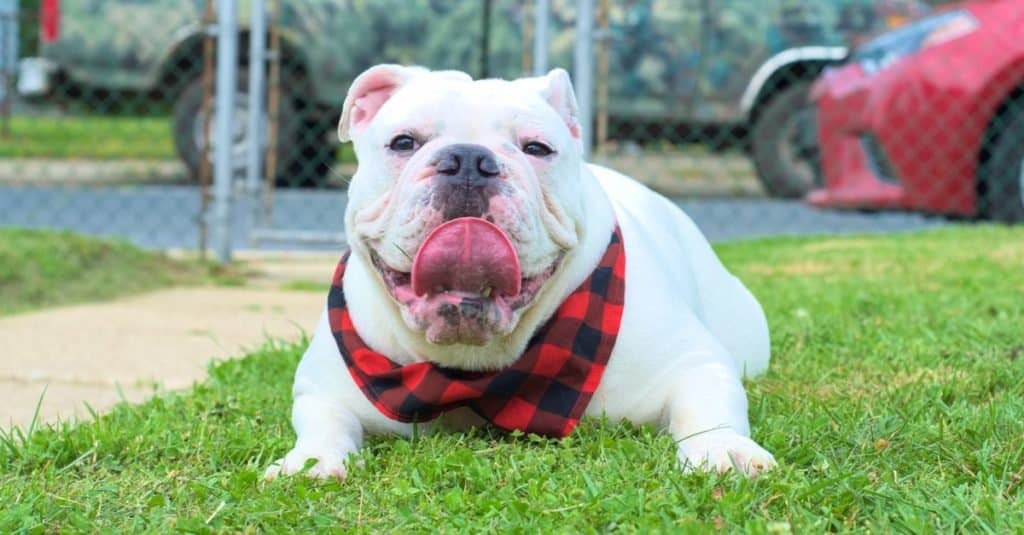Have you ever gotten frustrated when training your Bulldog? Or maybe they’ve surprised you with their intelligence! Either way, you might be left wondering: how smart are Bulldogs, really?
Bulldogs rank on the bottom tier for dog intelligence when testing for IQ or working intelligence. This means that they’re slow to learn new things and listen less frequently than many other dog breeds. However, Bulldogs can learn so long as their trainer has patience and understands that they may struggle in certain areas.
Bulldogs also excel at many things, such as acting as watchdogs, recognizing emotions, comforting their humans, and, sometimes, hunting!
In this article, we’ll discuss the different forms of dog intelligence and how smart Bulldogs are as a breed. Remember that every dog is different, so this information may not apply to every Bulldog you meet!
Exploring the Intelligence of Bulldogs

Bulldog sniffing a plate of donuts.
©iStock.com/monkeybusinessimages
Bulldogs are typically seen as unintelligent because they’re slow to learn new things and can be stubborn. This combination can make training difficult, even though Bulldogs are people-pleasers overall and want to make their humans happy!
However, there are different types of intelligence–dog IQ, or working intelligence, is just one way to measure how smart dogs are. Another is problem-solving–which Bulldogs also tend to be bad at.
Bulldogs are smart when it comes to following their instincts. Most Bulldogs make good watchdogs because they’re alert and have an instinct to guard. They may also have a high prey drive, making them good at chasing, retrieving, and hunting.
Lastly, Bulldogs are emotionally intelligent, compassionate animals. They pick up on how the people around them are feeling. They may become sad when their favorite person is feeling down or offer cuddles to comfort them when they’re upset.
The Cognitive Capabilities of Bulldogs: Understanding Their Problem-Solving Skills and Brain Size

Problem-solving can be difficult for Bulldogs, and they need some help in order to learn new things.
©WilleeCole Photography/Shutterstock.com
First, it’s important to know that brain size doesn’t necessarily impact a dog’s intelligence. Dogs with smaller brains can be just as smart, or smarter, than dogs with big brains, and vice versa.
That said, Bulldogs have relatively large brains when compared to other breeds. It’s also fascinating to learn that domesticated dogs’ brains are growing larger over time, according to a study published in the International Journal of Evolution. Dogs’ brains are smaller than wolves, which is an expected finding in domesticated vs wild animals. But, the more dogs evolve as a domesticated species, the larger their brains are growing!
Another cool tidbit about Bulldog brains is that they’re structured a bit differently from some other dog breeds. The olfactory bulb, which transfers information about scents from the nose to the brain, is pushed back beneath the frontal lobe due to their short snouts. This is true of other brachycephalic dog breeds as well, but not for those with longer snouts.
Problem-Solving Skills in Bulldogs
When it comes to problem-solving, Bulldogs don’t tend to excel. However, this doesn’t mean they’re incapable of learning new things or playing with puzzle toys, for instance. It just means they need more time and possibly accommodations in order to learn.
For instance, a dog with terrific problem-solving skills, like a German Shepherd, may be able to figure out puzzle toys quickly without help. But your Bulldog might need you to begin by placing treats out in the open, then covering them partially so they can still see them. This second step teaches them what they need to do to get the treat–whether they need to lift a cover, slide a piece over, or do something else.
Your Bulldog might not deduce this information on their own and might give up if they aren’t taught how to use the toy in steps.
The same goes for training new cues. You might have to start slower than you would with other breeds, and it’ll also likely take more repetition before your Bulldog masters a skill.
Bulldog’s Learning Aptitude: How Quick and Adaptive Are They?

It can take over 100 tries for a Bulldog to learn a new trick.
©iStock.com/WilleeCole
Bulldogs might need cues repeated over 100 times before they learn a new trick. That takes a lot of patience and can be frustrating for their humans–especially if they don’t understand how Bulldog brains work, and assume their pup is being stubborn or obstinate on purpose.
You might also find that your Bulldog performs a trick perfectly inside but won’t do it outside. Or, maybe they’ll sit when told on carpet but not on tile flooring.
This is common for dogs and may be seen more often for dogs with less working intelligence and problem-solving skills, like Bulldogs. The ability to know that sit means sit no matter what surface they’re on, who’s giving the cue, or where they’re located is known as generalization.
Bulldogs can get better at generalization through practice, but it might never come easily to them. Of course, we also have to factor in distractions and stressors when asking dogs to perform tricks in new environments.
All of this to say: If you want to train a Bulldog, go in expecting slow progress and have patience. Know that they’re usually trying their best and will get there with some extra help.
Intelligence Ranking: Where Does a Bulldog Stand Among Other Breeds?
Bulldogs rank low when it comes to IQ, at number 77 out of 79 dog breeds ranked by Dr. Stanley Coren in a study on dog obedience shows. They’re described as poor working dogs, which makes sense when you consider that Bulldogs today are primarily bred as companion animals.
They’re said to listen to cues around 30% of the time and need 100+ repetitions in order to learn something new.
Though your Bulldog won’t learn as fast as a Poodle (one of the smartest dog breeds), they can still excel at obedience, puzzle toys, and more. It’ll just take them a bit longer than other breeds.
Unlocking Your Bulldog’s Intelligence Potential: Training Techniques and Mental Stimulation

Working with your Bulldog daily will help them to learn more things and become smarter!
©Wirestock Creators/Shutterstock.com
Training
The more you train with your Bulldog, the smarter they’re bound to be. After all, expecting them to learn without training is like expecting a student to pass a test without studying.
For best results, keep training sessions short and engaging. Make it into a game and use high-value treats to reward them for doing right.
Never use aversive training methods on your Bulldog. This can make them want to avoid training or even avoid interactions with you altogether. Instead, learn force-free training methods to help your Bulldog succeed.
Break new tricks down into small steps, reward even the smallest bit of progress, and try your best to end training sessions on a high note. You don’t want to wait until you or your Bulldog becomes bored or frustrated, as that will make both of you less excited to train next time!
Daily Walks
Daily walks provide mental stimulation for your dog through observing their environment, sniffing, and encountering new experiences.
Your Bulldog doesn’t have to interact with people or other dogs on the walk to get a lot out of it, especially when it comes to socialization.
Sniffing is crucial for dogs because it helps them learn about their environment, “chat” with the other dogs who use that fire hydrant, and alleviate any stress they may be feeling.
Of course, also consider safety during walks! As a short-snouted breed, Bulldogs are more prone to exercise intolerance, trouble breathing, and heat strokes.
Always take walks and other exercise at their pace and stop if they need to. During hot days, you may need to stay indoors or walk at cooler times, such as early morning or late evening.
Observing their Surroundings
It might sound silly, but looking out the window or sitting in the front yard people-watching or bird-watching is actually very enriching for many Bulldogs!
They have watchdog instincts, and these are fulfilled by remaining alert to their environment. Of course, we can’t rely on this as their only mental enrichment–but it’s an easy way to make them happy if they enjoy it!
Puzzle Toys and Nose Work
Puzzle toys and nose work go hand in hand, as they’re both about your Bulldog finding hidden items. Both activities will be a bit harder for a Bulldog than, say, a Beagle or German Shepherd, but they can still have fun when the activities are taught to them properly.
Bulldogs have low problem-solving abilities and also short noses that can’t sniff out items, as well as dogs with longer snouts. So, these things can work against them.
Start by placing treats with strong odors out in the open, such as on the arm of a chair or in an uncovered puzzle toy. You might even need to point out the treat the first few times so that they understand.
Slowly make the game more difficult by partially, then fully covering the treat. You can also try playing hide-and-seek with humans or their favorite toys.
Pairing a cue with the gam,e such as “find it,” also helps so that your Bulldog knows they should be looking for something. Otherwise, they might not even know to look!
The photo featured at the top of this post is © iStock.com/monkeybusinessimages
Ready to discover the top 10 cutest dog breeds in the entire world?
How about the fastest dogs, the largest dogs and those that are -- quite frankly -- just the kindest dogs on the planet? Each day, AZ Animals sends out lists just like this to our thousands of email subscribers. And the best part? It's FREE. Join today by entering your email below.
Thank you for reading! Have some feedback for us? Contact the AZ Animals editorial team.







